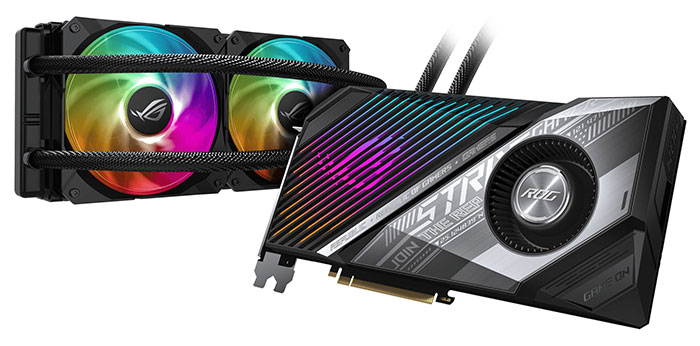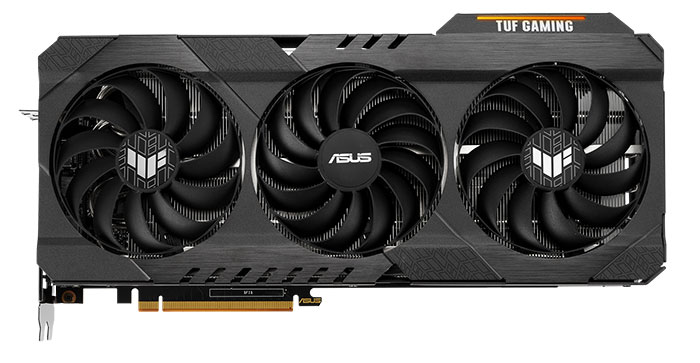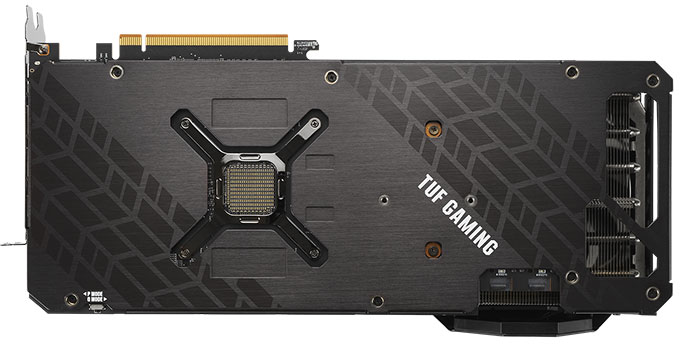Asus wins a merit award for being the first to share details of its upcoming Radeon RX 6800 series graphics cards line up, which will be added shortly to its ROG and TUF stables. Today it has outlined four new RDNA 2 graphics cards in all; two Radeon RX 6800 XT models and two Radeon RX 6800 models - all of them factory overclocked, and all sporting onboard Aura RGB LEDs. For an overview of the different Radeon RX 6000 series graphics card base models please refer to the HEXUS editor's article from the launch yesterday.
The Asus ROG Strix LC Radeon RX 6800 XT features integrated AIO liquid cooling solution. Asus engineers were inspired to create this AiO cooled card in order to "fuse the power of air and liquid cooling out of the box". It says the LCS was designed from the ground up for the new series of cards from AMD.

Specifically, a large cold plate cools both the GPU die and the GDDR6 memory modules that circle the GPU and heat is transferred directly from there to the liquid cooling loop. At the other end a 240mm radiator was considered to be the optimal choice. This isn't the only active cooling on the Asus ROG Strix LC Radeon RX 6800 XT though, Asus also equips a low-noise blower fan and low-profile heat sink within the PCI slot shroud to keep power delivery components cooled.
The above card's stablemate is the ROG Strix RX 6800. This air cooled example is said to feature the "full complement of ROG innovations," whatever that means to you. In more concrete terms we learn that it features a 2.9 slot design with triple Axial tech fans (counter-rotating central fan), multiple heat pipes and a MaxContact base plate. Furthermore, the design's fans are aide to extend beyond the custom short PCB used by Asus, so there is a venting cutout on the backplate for better airflow possibilities.

Asus has TUF Gaming Radeon RX 6800 XT and RX 6800 cards too. It says both these graphics cards feature a "2.9-slot heat sink built for plenty of thermal headroom and quiet operation under the demands of today's highest-wattage GPUs". Just like the ROG Strix air cooled card above, these SKUs use a triple axial fan design with the centre fan spinning the opposite way to its siblings. The new AMD-powered TUF cards feature an angular aluminium shroud with full length aluminium backplates and vent cutouts due to their custom short PCBs.

Asus says that all the above new graphics cards are built with Auto-Extreme assembly technology, feature durable components, and go through 144hr testing.

Sadly Asus hasn't filled us in with details about what exactly we should expect in terms of clock speeds from this 'OC' quartet. At the time of writing the product pages are yet to be uploaded and we don't have indicative pricing either. Remember, the first Radeon RX 6800 and 6800 XT GPUs will be released on Wednesday 18th November.
You might get to learn some more tasty morsels about this quartet during the ROG Pulse Livestream from 7pm PST tonight (2am tonight in UK) which you can catch on Twitch.













